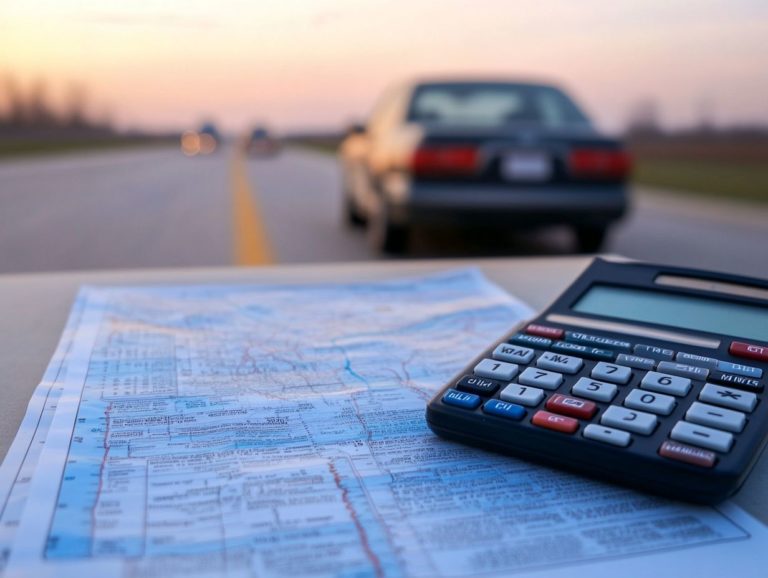What to Do When Moving to a New State
Moving to a new state can evoke a blend of excitement and overwhelm. With this fresh start comes a wealth of preparation and logistics that demand your attention.
Researching your new home is crucial. Creating a moving plan is equally important for a smooth transition. You ll need to secure housing, orchestrate the transport of your belongings, and update essential details like your address and utility services.
Adapting to life in a new community introduces an additional layer to your adventure. This guide will navigate you through every phase of the moving process, aiming to make your relocation as seamless as possible.
Contents
- Key Takeaways:
- Preparing for the Move
- Managing Logistics
- Updating Important Information
- Adjusting to Life in the New State
- Frequently Asked Questions
- What do I need to do before moving to a new state?
- Do I need to register my vehicle when moving to a new state?
- What should I do with my current driver’s license when moving to a new state?
- How do I find a new doctor and transfer my medical records when moving to a new state?
- What do I need to know about taxes when moving to a new state?
- Do I need to notify my bank and credit card companies when moving to a new state?
Key Takeaways:
- Research your new state’s cost of living, housing options, and job market now!
- Create a detailed moving plan to stay organized and on track with logistics include timelines and budget considerations!
- Update important information such as address, mail forwarding, and utilities notify banks, subscriptions, and government agencies!
Preparing for the Move
Preparing for a move across state lines demands a well-structured strategy. This strategy carefully considers your moving budget, job prospects in your new locale, and the utilities you’ll need to establish.
It s crucial to create a detailed moving checklist that includes everything from paperwork to nearby stores and other essential aspects of your relocation. Grasping these elements will not only facilitate a smoother transition but also enable you to manage the moving costs more effectively.
Researching the New State
Researching your new state is an essential first step in the moving process. It enables you to make informed decisions about housing options, local amenities, and the overall cost of living.
Gaining insight into the job market is equally crucial; it allows you to identify viable employment opportunities that align with your skills and career aspirations. A solid understanding of the local economy can provide you with a sense of job security and growth potential that is invaluable.
The climate in your new state will influence your lifestyle choices, impacting everything from your wardrobe to the outdoor activities you pursue.
You may also discover that nearby parks, community centers, and cultural venues play a significant role in shaping your social life. This leads to enriched experiences and greater overall satisfaction in your new environment. Get excited about discovering new parks and community centers!
Creating a Moving Plan
Creating a detailed moving plan is crucial for ensuring a seamless transition. This plan should include a well-defined moving budget, a comprehensive moving checklist, and a meticulously organized order for paperwork.
By establishing a clear timeline, you can guarantee that each step unfolds methodically from gathering essential documents to finalizing contracts with your chosen moving company. It s also vital for you to compile an inventory of items to be packed, which not only aids in decluttering but also allows for a more accurate estimation of moving costs.
Packing tips, such as labeling boxes and safeguarding fragile items, become invaluable during this whirlwind of activity. Coordination with the moving company is essential; effectively scheduling pickups and deliveries can stave off last-minute hiccups, transforming the moving experience into a more manageable and less stressful endeavor.
Managing Logistics
Managing logistics during your move is essential for ensuring that every detail from your belongings to travel arrangements is meticulously coordinated. This approach minimizes potential stress and unexpected expenses, allowing for a smoother transition to your new space.
Finding a New Place to Live
Finding a new place to live is a crucial step in your moving journey. Carefully assess housing options based on factors like cost of living, local amenities, and your personal needs.
This decision often hinges on whether you want to rent or buy a home. Each choice has its own advantages and challenges.
As you navigate this process, consider essential factors like neighborhood safety, accessibility to work, and the quality of local schools. These can significantly influence your daily life.
Engaging in community events and social activities is vital for cultivating a fulfilling lifestyle. By thoroughly evaluating these elements, you can make informed decisions that align with your long-term goals, enhancing both your living experience and your sense of belonging in your new environment.
Transporting Belongings
Transporting your belongings safely is paramount during any move. This requires a carefully planned method that involves selecting the right moving company and employing effective packing techniques.
Finding a reputable moving company is crucial. It can be the linchpin between a seamless relocation and a chaotic experience. Research your options thoroughly by diving into customer reviews, checking licensing, and verifying insurance coverage to ensure the service aligns with your needs.
If you are considering long-distance moves, also factor in additional considerations such as delivery timelines and potential fees to avoid unwelcome surprises.
For packing, utilize sturdy boxes, proper cushioning materials, and clearly label each item. This can significantly mitigate the risk of damage during transit.
Familiarizing yourself with the typical expenses associated with moving will enable you to budget effectively and identify areas where you can save, such as opting for a DIY approach for certain tasks.
Updating Important Information
Updating essential information is a crucial aspect of the moving process. You’ll want to jump right into updating your address and transferring utilities and services to your new home.
This ensures a seamless transition and helps you settle in without unnecessary interruptions.
Changing Address and Forwarding Mail
Changing your address and forwarding your mail are tasks that should never be overlooked during your move. These steps ensure you stay connected and receive all important communications.
If you neglect to update your information promptly, you may face delays in receiving bills, official documents, or even time-sensitive packages. To begin this process, start by notifying the post office. They re your best bet for facilitating the forwarding of your mail for a specified period.
Once that s squared away, reach out to institutions like banks, insurance providers, and utility companies to update them with your new address. Don t forget to inform the Department of Motor Vehicles and voter registration offices to remain compliant with local laws.
By managing these changes efficiently, you can minimize the risk of missed communications and enjoy a smooth transition to your new home.
Transferring Utilities and Services
Transferring utilities and services is crucial for a seamless transition into your new home. This ensures that all essential amenities are in place before you arrive.
To kick off this process, compile a checklist of the necessary services you ll need. Typically, this includes:
Here s a checklist of essential services you need:
- Electricity
- Water
- Gas
- Internet
- Garbage collection
Reach out to each utility company at least a couple of weeks before moving day to sidestep any last-minute hiccups. Be prepared to provide personal identification, proof of address, and possibly a deposit, depending on the service provider.
Keep in mind that each company may have different policies regarding setup times. Understanding their timelines is key to ensuring everything is ready when the moving truck arrives. A bit of foresight can transform what could be a chaotic experience into a smooth and enjoyable one.
Adjusting to Life in the New State
Adjusting to life in a new state means immersing yourself in the local community, participating in social activities, and crafting a routine that aligns with your lifestyle and preferences.
Exploring the Community
Exploring the community in your new state is not just enjoyable; it’s a vital step in your adjustment journey.
It opens the door to local amenities, social activities, and the chance to connect with your neighbors.
As you visit nearby parks, recreational facilities, and community centers, you’ll find yourself fully immersed in the vibrant atmosphere that each locality has to offer.
Engaging with local groups will help you cultivate new friendships and present valuable opportunities for collaboration on various projects, events, and activities.
This deeper connection to the community enhances your social interactions, making your experience all the more meaningful.
Join community events! They can boost your sense of belonging and make you feel right at home.
Create Your Exciting New Routine!
Building a new routine after a move is essential for establishing a sense of normalcy and stability in your life.
It allows you to integrate work, family, and social activities seamlessly.
Start your new routine today! It s key to feeling settled quickly.
Begin by crafting a daily, weekly, and monthly schedule that balances these vital areas; it can significantly enhance your overall well-being.
Outline time blocks for your professional commitments to ensure productivity, while also reserving slots for family bonding whether that s through shared meals or weekend adventures.
Stay flexible. Life can be unpredictable, so it s important to adapt as needed.
By embracing this adaptability, you can ensure that your routine remains supportive and fulfilling, fostering both personal and communal growth.
Frequently Asked Questions
What do I need to do before moving to a new state?
Before moving, research the area, find a place to live, and update your address.
Do I need to register my vehicle when moving to a new state?
Yes, you will need to register your vehicle in your new state within a certain time period. Check with the DMV for specific requirements.
What should I do with my current driver’s license when moving to a new state?
You will need to surrender your current driver’s license and apply for a new one in your new state of residence. Some states may allow you to transfer your current license, so be sure to check with the DMV.
How do I find a new doctor and transfer my medical records when moving to a new state?
Research doctors in your new area and schedule appointments before your move. Once you have chosen a new doctor, you can request your medical records to be transferred from your previous healthcare provider.
What do I need to know about taxes when moving to a new state?
You will need to familiarize yourself with the tax laws in your new state and file taxes accordingly. Also, be sure to update your address with the IRS and your employer for tax purposes.
Do I need to notify my bank and credit card companies when moving to a new state?
Yes, it is important to update your address with your bank and credit card companies to ensure that you receive important mail and to prevent any issues with your accounts.
Ready to make your move? Let s get started!



